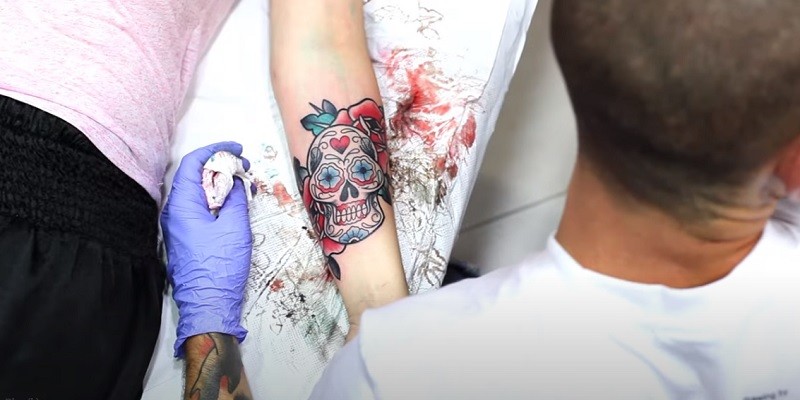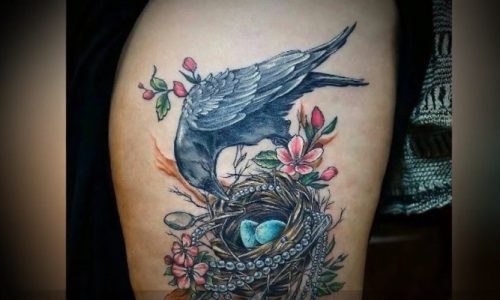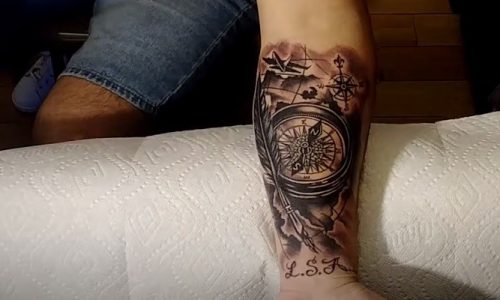Last Updated on June 18, 2025 by Jaclyn A. Neeley
Bruising is normal in tattooing, as every body is different and minor reactions to tattoos are common. However, the bruising usually fades within a week, so there is no need to panic, especially if you tend to bruise easily.
Let’s take a closer look at some common tattoo side effects to put your mind at ease.
Tattoo Bruising
Tattoo bruising is a common occurrence during the tattoo healing process. It can be alarming for some, but rest assured, it is often normal and temporary. In this section, we will explore the causes of tattoo bruising, how common it is, and what it looks like.
Causes Of Tattoo Bruising
Tattoo bruising can be caused by several factors:
- Needle trauma: When the tattoo needle punctures the skin, it can cause small blood vessels to burst, leading to bruising.
- Deep tattooing: If the artist goes too deep into the skin layers, it can result in more bruising.
- Sensitive skin: Some individuals may naturally have more delicate skin that is prone to bruising.
How Common Is Tattoo Bruising?
Tattoo bruising is relatively common, especially in individuals with sensitive skin or those getting larger or more detailed tattoos. However, the severity and extent of bruising can vary from person to person.
Read More – Is Dawn Dish Soap Safe For Tattoos?
What Does Tattoo Bruising Look Like?
Tattoo bruising typically appears as areas of discoloration around the tattooed area. The color can range from reddish-brown to purple or blue. Bruises may also feel tender or slightly raised to the touch. It’s important to note that bruising should subside within a week or two as the body naturally heals.
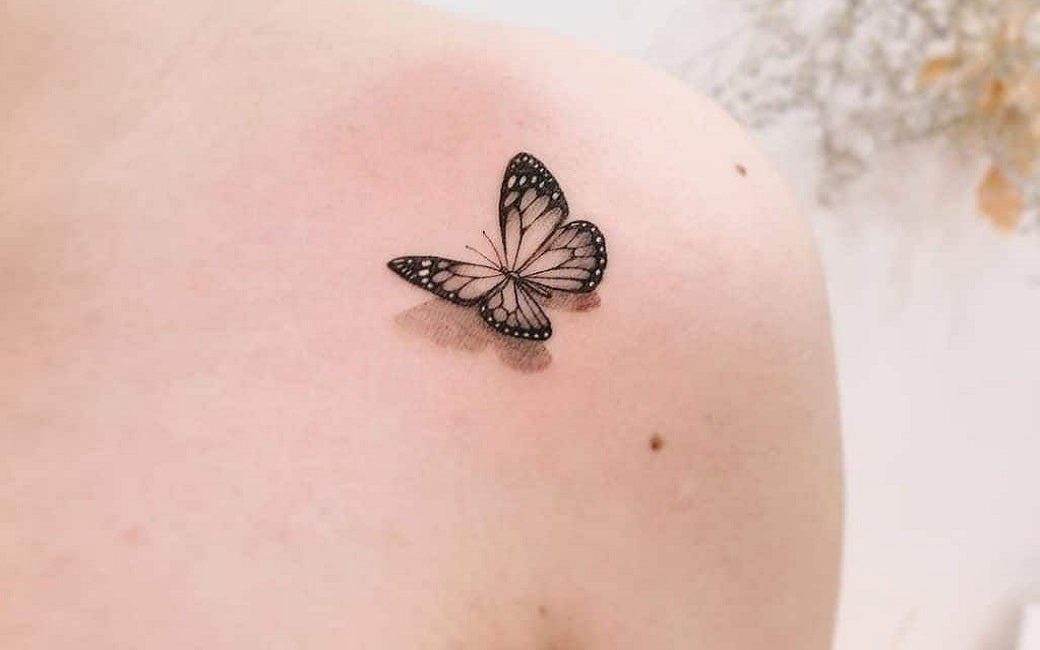
Credit: favvosee.com
Tattoo Bruising Vs. Tattoo Healing
When it comes to getting a tattoo, it’s important to know what to expect during the healing process. One common concern that arises is the possibility of bruising. While bruising may occur after getting a tattoo, it’s essential to distinguish between tattoo bruising and proper tattoo healing. Let’s delve deeper into these two aspects to gain a better understanding.
Distinguishing Between Bruising And Healing
Before worrying about bruising, it’s crucial to recognize the difference between bruising and the natural healing process. Bruising occurs when blood vessels under the skin break, causing a discoloration due to blood pooling. In the case of tattoos, bruising can be a normal reaction to the trauma caused by the needle. On the other hand, healing refers to the body’s natural response to repair the damaged skin and integrate the tattoo ink.
Signs Of Proper Tattoo Healing
Proper tattoo healing involves several stages, and it’s vital to know the signs that indicate your tattoo is healing correctly. Here are the key signs to watch out for:
- The initial swelling: It’s normal for the tattooed area to swell immediately after the tattooing process. This swelling is a result of the skin’s response to the trauma. However, it should subside within a few days.
- Redness and tenderness: In the following days, you may experience redness and increased sensitivity around the tattooed area. This is a normal part of the healing process and should gradually lessen over time.
- Itching: As the tattoo heals, you may experience some mild itching. It’s essential to resist the urge to scratch and instead opt for gentle tapping or moisturizing the area.
- Peeling and scabbing: Around the one-week mark, you may notice the tattooed skin starting to peel or scab. This is a natural part of the healing process, and it’s crucial not to pick at the scabs to avoid causing damage.
- Clear, vibrant colors: As the healing progresses, your tattoo should start to reveal its true colors. The ink should settle and appear clear and vibrant, indicating that the healing process is going well.
Read More – Did Jimmy Buffett Have Any Tattoos?
How To Manage And Minimize Tattoo Bruising
While tattoo bruising is normal, there are steps you can take to manage and minimize it. Here’s what you can do:
- Follow proper aftercare: Ensure you adhere to the aftercare instructions provided by your tattoo artist. Cleaning the tattoo regularly, applying healing ointment, and keeping it moisturized can help promote optimal healing.
- Avoid strenuous activities: Engaging in strenuous activities can exacerbate bruising. It’s advisable to avoid activities that put strain on the tattooed area, especially during the initial healing stages.
- Apply cold compresses: If you notice significant bruising, you can apply cold compresses or ice packs to the area. The cold temperature can help reduce swelling and minimize bruising.
- Elevate the tattooed area: If bruising persists, you can elevate the tattooed area to encourage fluid drainage and reduce swelling.
- Be patient: Remember that bruising is a temporary side effect of the tattooing process. With time and proper care, the bruising should fade, revealing your beautiful tattoo underneath.
By understanding the difference between tattoo bruising and healing and knowing how to manage and minimize bruising, you can navigate the tattoo healing process with confidence. Remember to consult your tattoo artist if you have any concerns or questions during the healing journey. Happy healing!
Factors Affecting Tattoo Bruising
One of the main factors that can contribute to tattoo bruising is an individual’s skin sensitivity and predisposition to bruising. Some people naturally have more sensitive skin, which can make them more prone to bruising. Additionally, individuals with thinner skin or those who have a history of easy bruising may experience more bruising during the tattooing process.
Impact Of Tattooing Technique On Bruising
The tattooing technique used by the artist can also have an impact on the likelihood of bruising. If the artist is too rough or applies too much pressure while tattooing, it can cause the blood vessels underneath the skin to rupture, leading to bruising. Similarly, if the needle is inserted too deeply into the skin, it can also result in bruising.
Tips For Preventing And Reducing Tattoo Bruising
To minimize the risk of tattoo bruising, there are several steps you can take:
- Choose an experienced tattoo artist who is known for their gentle technique.
- Inform your artist about any skin sensitivity or history of bruising you may have.
- If you are prone to bruising, consider taking over-the-counter Arnica supplements a few days before your tattoo appointment, as Arnica is believed to help reduce bruising.
- Avoid blood-thinning medications or supplements, such as aspirin or fish oil, in the days leading up to your tattoo session, as these can increase the risk of bruising.
- Follow proper aftercare instructions provided by your tattoo artist, which may include gentle cleaning, application of recommended ointments or creams, and avoiding excessive sun exposure or tight clothing that can irritate the tattooed area.
- If bruising does occur, applying a cold compress to the area can help reduce swelling and alleviate discomfort.
By understanding the factors that can contribute to tattoo bruising and taking preventative measures, you can help ensure a smoother healing process and a beautiful, bruise-free tattoo.
Credit: www.reddit.com
Read More – Does Anna Kendrick Have Tattoos?
Addressing Concerns And Misconceptions
When it comes to getting tattoos, it is natural to have concerns and misconceptions about various aspects of the process. One particular concern that often crops up is the presence of bruising after getting a tattoo. In this section, we will address the common concerns and misconceptions surrounding tattoo bruising, providing you with the information you need to put your mind at ease.
Is Tattoo Bruising A Cause For Worry?
It is essential to understand that tattoo bruising is actually quite common and not typically a cause for worry. While tattoos are essentially small wounds created by a tattoo needle, the skin’s natural response to trauma can lead to bruising. The bruising may vary in severity and can last for a few days or up to a couple of weeks. However, if the bruising is accompanied by severe pain, excessive swelling, or signs of infection such as pus or red streaks, it is crucial to seek professional medical advice.
Symptoms of normal tattoo bruising include:
- Mild pain or discomfort around the tattooed area
- Discoloration, such as purple, blue, or greenish hues
- Tenderness to touch or pressure
- Swelling around the tattoo
Dispelling Common Myths About Tattoo Bruising
There are several misconceptions associated with tattoo bruising, and it’s important to separate fact from fiction. Let’s debunk some common myths:
- Myth: Tattoo bruising is a sign of a botched tattoo.
- Reality: Tattoo bruising is a natural response of the body, and it does not necessarily indicate a poorly executed tattoo. It is crucial to remember that everyone’s skin reacts differently, and bruising can occur regardless of the artist’s skill.
- Myth: Bruising only happens with larger tattoos or certain body parts.
- Reality: Tattoo bruising can occur regardless of the tattoo’s size or location on your body. Factors such as skin sensitivity, blood clotting tendencies, and the amount of trauma induced during the tattooing process contribute to bruising.
- Myth: Tattoo bruising always indicates an infection.
- Reality: While infection can cause bruising, not all tattoo bruising indicates an infection. It is important to distinguish between normal bruising and signs of infection, such as fever, chills, and oozing.
Seeking Professional Advice And Assistance
If you have concerns or are experiencing excessive bruising after getting a tattoo, it is always recommended to seek professional advice and assistance. A qualified tattoo artist or a healthcare professional can provide guidance and ensure proper healing. They can evaluate the situation and determine whether any additional steps, such as medical intervention or adjustments to aftercare routines, are necessary. Remember, professionals are the best source of reliable information when it comes to caring for your tattoos.
Credit: www.reddit.com
Frequently Asked Questions Of Can Tattoos Bruise Is Normal?
Is It Common For Tattoos To Bruise?
It is not common for tattoos to bruise, but some bruising may occur if the artist is too rough or the needle goes too deep. Swelling and tenderness can also be expected in certain areas. However, these effects usually fade within a week.
How Do I Know My Tattoo Is Healing Properly?
After a week, bruising and swelling around the tattoo should start to subside. By the end of a month, any itching, redness, and bruising should have completely disappeared. It may take up to six months for your tattoo to be fully healed.
Remember to continue with your aftercare routine during this time.
What Should A 3 Day Old Tattoo Look Like?
It is common for a 3-day old tattoo to have minimal bruising, swelling, and tenderness, especially in dark shaded areas. The artist should not be too rough or go too deep with the needle. After a month, itching and redness should subside, and the tattoo may appear fully healed.
Healing can continue for up to six months.
What Does A Tattoo Blowout Look Like?
A tattoo blowout is when the lines in a tattoo become blurry and the ink spreads outside the intended area, giving the tattoo a smudged appearance. It can look like the ink is bleeding outward from the tattoo.
Question 1: Can Tattoos Cause Bruising?
Yes, it is possible for tattoos to cause bruising, especially if the artist is too rough or the needle goes too deep. Bruising is generally kept to a minimum, but some swelling and tenderness can be expected.
Conclusion
While it is not common, some people may experience bruising after getting a tattoo. This is generally nothing to worry about and can be attributed to the body’s unique reactions. It is important to remember that bruising should subside within a week to a month, and proper aftercare is crucial during the healing process.
If you have any concerns about your tattoo healing properly, it is always best to consult with your tattoo artist or a healthcare professional.

